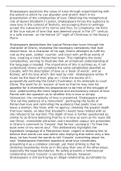Shakespeare questions the value of rules through experimenting with
the extent to which he can abandon and stretch them in his
presentation of the complexities of love. Obtaining the metaphorical
role of Queen Elizabeth I’s jester, Shakespeare forces the audience to
view love in the context of festivity, encouraging them to willingly
accept the subversion of its norms and thus, its complexity. He hints
at the true nature of love that was deemed unjust in the 17 th century
in a safe manner, on the festive 12th night of Christmas in the illusory
Illyira.
Shakespeare destabilises the typical Petrarchan lover through the
character of Orsino, revealing the necessary complexity that love
should have. As a character of his age, Orsino attempts to fulfil his
role as the poet, soldier, courtier, and lover with artificial words of
love, creating a mock Petrarchan lover. This highlights the loves’
complexities, serving to illustrate that an enhanced understanding of
the language is needed. The importance of this is outlines as, if not
understood, Orsino will complete the same established downfall as
Claudio, with his description of love as a ‘book of words’, and as
Romeo, with his love which ‘did read by rote’. Shakespeare writes ‘If
music be the food of love, play on: / Give me excess of it’,
purposefully outlining the Duke’s frustration in his attempts to court
Olivia. The want for an ‘excess’ of love so that he may lose his
appetite for it intensifies his desperation to be free of the struggle of
love, underscoring the more negative and exclusionary nature of love.
Paired with the question as to whether this is love or simply
infatuation, the complexity of love is presented. Shakespeare writes
‘She sat like patience of a monument’, portraying the faults of
Petrarchan love and reminding the audience that poetic love can
leave a women, like Viola, with no agency, showing the greater depth
that love needs, an idea that Elizabeth I would have related with as
she refused to be married. The depth of love is further questioned as,
similar to as Orsino believing that he is in love as soon as his ‘eyes did
see Olivia’, immediate attraction and irresistible vapour are presented
in Orsino’s comment to ‘Cesario’ that he has ‘unclasp’d / To thee the
book even of my secret soul’. This deliberately highlights the
hyperbolic language of a Petrarchan lover, cogent in showing him to
believe that words can woo whilst also implying that within only a few
days, he has found the words to tell ‘Cesario’ everything about his
soul. Shakespeare therefore questions what love constitutes,
presenting it as a complex concept, yet most striking is that he
stretches boundaries more so in this play than any of his other plays,
especially the legal boundaries. He safely presents a homosexual
relationship since ‘Cesario’ is secretly a female, however,
Shakespeare is still portraying an illegal relationship, punishable by




